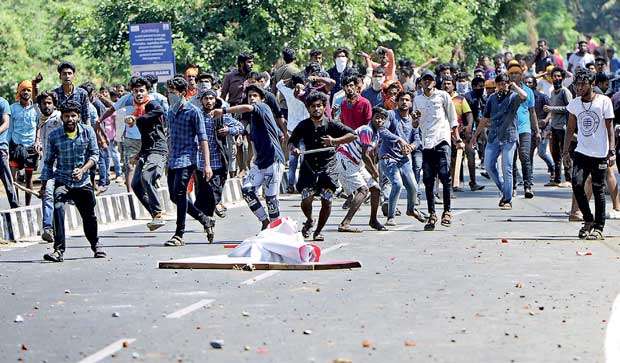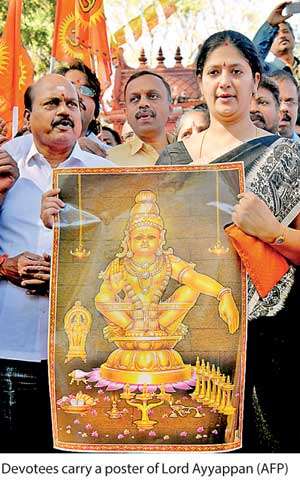Reply To:
Name - Reply Comment

 Kerala, in South India, which hots up as a result of pilgrim travel during this part of the year, is boiling due to violence and tension.
Kerala, in South India, which hots up as a result of pilgrim travel during this part of the year, is boiling due to violence and tension.
The roads leading to the 85 km jungle path have drawn aggressive protesters who are checking vehicles to ensure there aren’t women of menstruation age whishing to make the pilgrimage to Lord Ayyappan’s abode; a temple situated in the Periyar Tiger Reserve in Pathanamthitta district in Kerala, India.
This year’s pilgrimage drew the attention of India’s neighboring countries, especially Sri Lanka because a woman by the name of Shashikala is said to have defied tradition and entered the temple site. Her visit, confirmed by television footage, sparked violence. Protesters disapproved her presence at the holy site because she is a women who is in her 40s. She had produced a medical certificate to confirm attaining menopause, but it was to avail. By Friday as many as 4980 people were arrested after scenes of violence and there were even reports of stabbing incidents. One person suffered death due to stabbing.
Sri Lankans have the habit of travelling to Kerala for the pilgrim season which is now in to its second phase. Pilgrims from all parts of Sri Lanka honour a 48-day long period of penance before taking the flight to India. According to tradition women of menstruation age (10-50) have not joined these pilgrim groups. But several women defied this tradition this season (2018/19) and made the trek to the temple or at least to the base camp, fueling their resolve with the Supreme Court ruling which now allows women of all age to visit the shrine.
India has paid dearly for the violence because both the United Kingdom and the United States of America have issued travel advisories to its citizens. The advisories warn them to be cautious if they are travelling in this part of India
But more than the Sri Lanka women, two females from India’s own Kerala entering the temple had the effect of ‘adding fuel to fire’ because their moves challenged tradition. The temple authorities in retaliation to this woman and other females entering the temple closed it for several hours and conducted a purification ritual.
Religion in India has fiercely guarded the tradition of women during menstruation not being allowed into places of religious worship. The historic Supreme Court ruling (Issued on September 28) drew both praise and negative responses. But the powerful Nair Service Society criticized the CPI (M) led State Government over the entry of the women to the temple and also accused it of making plans to impose atheism on people. Those voicing their support in favour of the verdict point out that there is no scientific justification for the argument of menstrual pollution.
But what’s even more shocking than the peace that’s been disturbed is the politically influenced violence. It’s reported that the Congress and the BJP, both opposition parties in Kerala, have opposed the Left Democratic Front’s (LDF) efforts to implement the Supreme Court verdict.
Tourism sector affected
 India has paid dearly for the violence because both the United Kingdom and the United States of America have issued travel advisories to its citizens. The advisories warn them to be cautious if they are travelling in this part of India. Having a healthy environment in Kerala is so important for India. This is because 10% of Kerala’s GDP is derived from the tourism sector.
India has paid dearly for the violence because both the United Kingdom and the United States of America have issued travel advisories to its citizens. The advisories warn them to be cautious if they are travelling in this part of India. Having a healthy environment in Kerala is so important for India. This is because 10% of Kerala’s GDP is derived from the tourism sector.
It’s interesting to view the ‘Sabarimala’ issue from a Sri Lankan perspective because of two reasons. One is the safety of the large number of pilgrims who travel from Sri Lanka to India during the pilgrim season and the other fact is that this country is multi-religious; which makes practitioners of other faiths form opinions about this pilgrimage. Sri Lankans have been part of a large section of migrant travelers who fly to India for the pilgrimage. And surprisingly almost all Sri Lankan women who are Hindus also support the tradition of banning women of menstruation age from joining these travel groups. There is the All Ceylon Ayyappan Temple in Aluthmawatha in Colombo 15 which conducts ceremonies connected with the pre-pilgrimage season and also educates devotees as to how to perform the 48-day long fast of penance.
Seasoned travelers -called Guru Swamis- voiced that pilgrims who don’t follow strict penance can be in for trouble during the 85 Km trek through the forest or even before they begin. Someone is considered a pilgrim after he makes a vow to visit Sabarimala and wears a traditional garland made of Basil (Tulsi) seeds. There have been many records of pilgrims not honoring these religious rites of purification the proper way experiencing untold troubles during the long trek through the jungle.
Gender equality
There are also records of Sri Lankans organising protests in Vavuniya condemning the Supreme Court decision and requesting the temple authorities at Sabarimala to be allowed to follow their own rules. They have even asked the Government of Sri Lanka to intervene in the matter through the Indian Embassy in the island.
As the violence and tension continue to simmer in Kerala, the words of the two Indian women who made the visit to the temple reverberate. Diviyanshu Dutta Roy was one woman who exposed her life to much danger and opted to go on the pilgrimage. She was accompanied by Bindu Ammani. Both women are in their 40s. They have said that their trip to the jungle temple will now make it easier for other women to make the trek. They have also said that the journey to Sabarimala is about devotion as well as about gender equality. They were quoted in saying that they had the support of many pilgrims and that the trouble was caused by people who wanted to play politics.
Religion has the potential to spark debate. But what’s of concern is that those debating, about the right young women have in participating in these religious ceremonies, belonging to the same faith.
But more than the Sri Lanka women, two females from India’s own Kerala entering the temple had the effect of ‘adding fuel to fire’ because their moves challenged tradition
This issue being a problem in the East will soon be resolved. This is because Asian women generally don’t oppose tradition and are submissive to males. These women have over the years looked after the home front while the men fork go on pilgrimage. If one checks our history it’s the females who have made much sacrifices to enable males to progress spiritually.